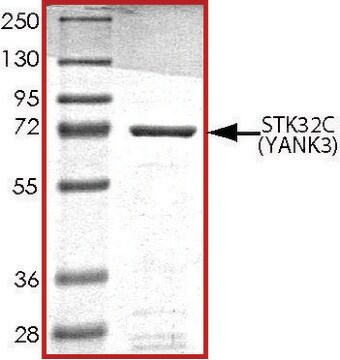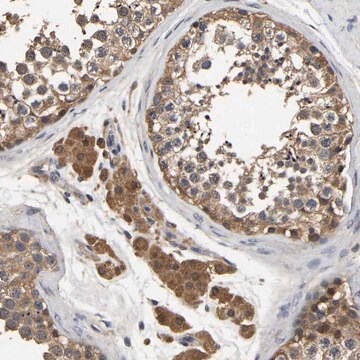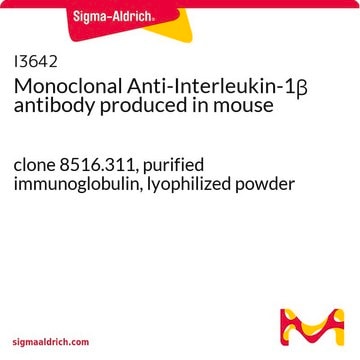推荐产品
一般說明
Bactericidal/permeability increasing protein (BPI) is a 456 residue protein which is part of the innate immune system. BPI was initially identified in neutrophils, but is found in other tissues including the epithelial lining of mucus membranes. It is an endogenous antibiotic protein with potent killing activity against Gram-negative bacteria. It binds to compounds called lipopolysaccharides produced by Gram-negative bacteria. Lipolysaccharides are potent activators of the immune system; however BPI at certain concentrations can prevent this activation. Bacterial/Permeability-Increasing Protein (BPI) is present in the azurophilic granules of polymorphonuclear leukocytes (PMN). BPI is toxic only toward Gram-negative bacteria. This specificity is attributable to the strong attraction of BPI for the lipopolysaccharides (LPS) in the bacterial envelope. BPI is also an important antigen for anti-neutrophil cytoplasmic autoantibodies (ANCA) in vasculitis.
外觀
Frozen in 80 mM Citrate Phosphate, pH 5.6, 0.75 M NaCl.
儲存類別代碼
13 - Non Combustible Solids
水污染物質分類(WGK)
WGK 3
閃點(°F)
Not applicable
閃點(°C)
Not applicable
Maria K Magnusson et al.
Inflammatory bowel diseases, 23(6), 956-966 (2017-04-27)
The clinical disease course of ulcerative colitis (UC) varies substantially between individuals and can currently not be reliably predicted. The gut microbiota and the host's immune defense are key players for gut homeostasis and may be linked to disease outcome.
我们的科学家团队拥有各种研究领域经验,包括生命科学、材料科学、化学合成、色谱、分析及许多其他领域.
联系技术服务部门

![四 [3,5-双(三氟甲基)苯基] 硼酸钠](/deepweb/assets/sigmaaldrich/product/structures/251/439/7a621e74-bfd1-4a43-833c-09adfcc1e0b3/640/7a621e74-bfd1-4a43-833c-09adfcc1e0b3.png)






